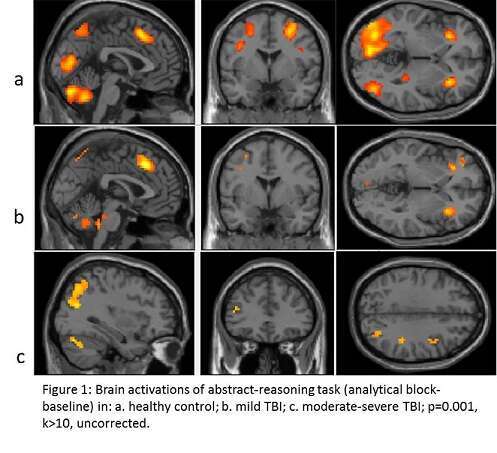Purpose: Traumatic brain injury (TBI) represents a significant public health concern as a leading cause of mortality and morbidity among young people in the industrialized world. TBI-related disabilities vary widely in type and duration and commonly result in reduced quality of life and prolonged social, medical and economic effects on society. Cognitive impairments are primary contributors to the disability of this population and include memory, speed of processing, attention and executive deficits, such as problem solving, abstract-reasoning, judgment and planning. Recently, there is a growing interest in the cognitive outcome of mild TBI, particularly in the absence of imaging evidence of brain pathology on CT scans of injury. Our research aimed to further investigate the injury severity effect on brain activation during an executive task.
Material & Methods: Forty-eight volunteers participated in the study: 14 mild TBI (GCS>13) and 9 moderate-severe TBI (GCS<13) patients were recruited. These included patients with CT scans post injury who were not hospitalized, patients from the Department of Neurosurgery, and the Head Trauma Rehabilitation Department at Sheba Medical Center, Tel-Hashomer. Twenty-five healthy controls matched by age and gender were recruited from the general population. All subjects undertook an MRI scan to assess anatomical abnormalities and performed an fMRI task of executive function. The task measures non-verbal abstract-reasoning and visual-spatial problem-solving abilities in a form similar to the Raven’s progressive matrices–R test (RPM-R), which is highly correlated with IQ scores.
Results: Our preliminary results show an injury severity effect on the brain activation of the abstract-reasoning task. Healthy controls exhibited activations mainly in a fronto-parietal network. Regions of activation included bilateral inferior and middle frontal gyrus, parahippocampal gyrus, precuneus, insula and cerebellum. Both TBI groups exhibited diminished activations compared to the controls. Mild TBI patients activated a similar network of regions, while moderate-severe patients exhibited activation in fewer regions compared to the controls (Figure 1).

Conclusion: Our preliminary results regarding the effect of the severity of injury on brain activations of abstract-reasoning, demonstrate a `dose response`. We found a linear effect between injury severity and cognitive outcome, thus, the more severely injured individuals displayed a poorer cognitive performance. Our findings enable better understanding of brain recovery mechanisms and specifically establish the role of injury severity in executive-related brain activation post-TBI.

